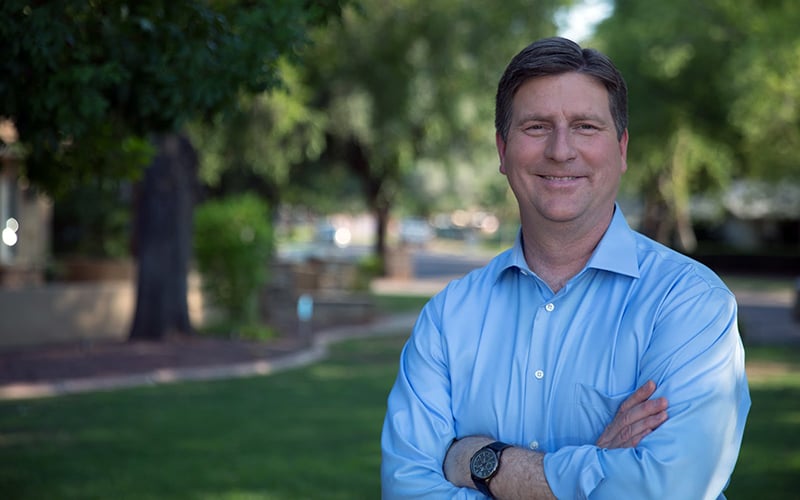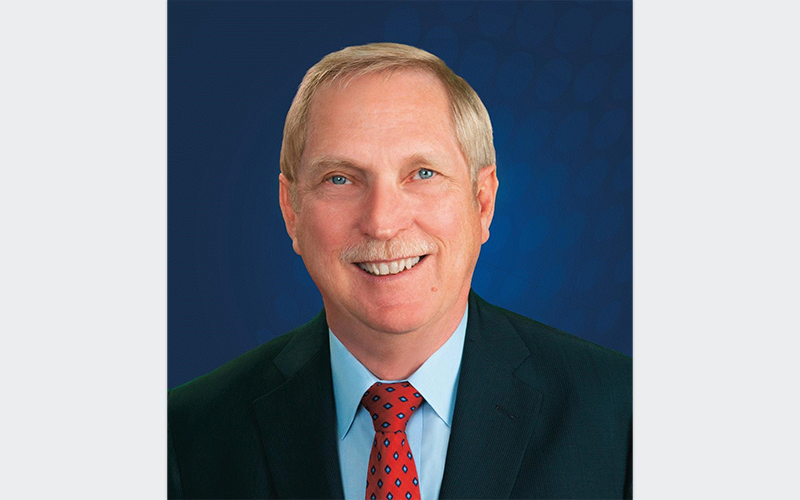
Political affiliation: Democrat
Position sought: U.S. House of Representatives, District 9
City of residence: Phoenix
Age: 50
Career: U.S. representative for District 9; former Phoenix mayor and city councilman.
With the election just days away, Cronkite News is profiling candidates on the Nov. 3 ballot.
How would you rate Arizona’s response to the COVID-19 pandemic?
“We’ve had almost close to 6,000 people die in the state of Arizona – that’s unacceptable. … I’m pretty angry about it because it didn’t have to happen.”
Arizona’s response to the COVID-19 pandemic has been poor, and it was mishandled from the start, he said.
“We fell weeks behind at the very beginning.”
Arizona’s first COVID-19 case was reported in late January, involving an Arizona State University student who had returned from China. That was earlier than other states, Stanton said, and Arizona’s poor handling of the pandemic is a failure at the top levels of state government.
When the U.S. Centers for Disease Control and Prevention sent Arizona the first batches of test kits, they were later found to be faulty, he said.
“I sent a letter to (Vice President) Mike Pence, who was chairing the president’s COVID-19 task force, blasting them, saying this is unacceptable.”
Stanton said the state reopened too soon in May, and Arizona got hit harder than other states because it didn’t do the heavy lifting to prepare.
“We didn’t set up a vigorous testing program. We did not set up a statewide contact tracing system. We had no system in place to help people in senior living facilities.”
The congressman released a five-point plan in June for battling COVID-19 that included a mask mandate, which was controversial at the time. Some Arizona mayors wanted to implement similar plans, “but unfortunately, the governor had preempted cities.”
“We play politics instead of following science.”
If reelected, what steps would you take to help mitigate the impact of this disease?
Stanton said he already is working toward providing additional relief to the millions of Americans disrupted by the pandemic.
“We’re fighting so hard for state and local support in the next relief package,” he said of House representatives.
It isn’t a partisan issue, he said. Because so many people are unemployed, Medicaid costs are going to increase, and additional resources will be needed. Schools also need additional support.
“We do not know what physical changes are going to be necessary in schools to protect students and teachers,” Stanton said, but additional personal protective equipment must be available for schools to safely reopen.
“We still need to have a real nationwide testing plan. We need to implement contact tracing best practices around the country. We need to put more resources into research on various types of vaccines.”
Additionally, adults in senior living facilities need more protection.
“People that are interacting with our seniors need to be tested weekly, not just once. These poor seniors have been stuck inside their long-term care facilities for months, in large part because we don’t have the rigorous testing program that we need to better support them.”
A new relief package needs to happen now: “If that doesn’t happen now, it’s going to happen soon after we get back in the new Congress.”
Do you have concerns regarding the security of our election?
His concerns are compounded by the Trump administration.
“It’s really crazy that the intelligence community won’t provide face-to-face briefings (on election security) to members of Congress anymore.”
Before briefings were canceled in August, Stanton said, he received information about Russia’s active efforts to interfere with the elections, a fact that is now public.
After the 2016 elections, despite evidence of Russian interference, Congress failed to stop such interference in the future, he said.
“We did pass many bills on election security,” he said of the Democratic-led House, “but those bills did not even get a hearing in the Senate. So you have foreign attempts to interfere in our election and then also you still have these voter-suppressive type efforts.”
Discouraging mail-in voting is an election security issue to Stanton.
“There is a unique challenge with this election, which is going to take place during a pandemic.”
He wants as many people to be able to vote by mail to avoid exposure to COVID-19 at polling places.
“The president is sort of trying to suggest that ballots that are mailed in are somehow suspect,” which could impact American’s perception about the fairness of the election.
“I would recommend that as soon as you get your ballot, mail it in right away.”
How could race relations be improved in Arizona?
Stanton wants to change how Arizonans view racial and ethnic diversity, which he considers a positive thing.
“We’re a border state; that’s a blessing. For so many years, people tried to scare people or suggest that our growing diversity is something to be afraid of.”
Immigrants and the Latino population are among Arizona’s greatest assets, he said.
“Our Latino population is younger, our Latino population is disproportionately bilingual, our Latino population is very entrepreneurial.”
Many Latino Arizonans have connections to Mexico and Latin America, which presents opportunities to grow the economy.
Arizona needs to focus on education and making sure everyone, including the Latino population, can access a college education.
To heal divisions, trust must be built between communities of color and law enforcement. Building greater transparency and accountability into policing systems is a start.
Stanton supported the George Floyd Justice in Policing Act, which would require changes in policing practices. The bill has been sent to the Senate.
In addition, shopping locally helps communities of color thrive, he said.
“Many of our locally owned businesses happen to be owned by people of color.”
What is the greatest issue Arizona residents face? If reelected, how would you address it?
Fighting COVID-19 and improving education are the prime issues.
“Arizona has traditionally been at the very bottom when it comes to education, resources and teacher pay,” which has been a drag on the state’s economy. Improving education will improve the economy.
In the bigger picture, he said, the key issue is climate change.
“If we don’t take more steps to fight climate change, Arizona, with our extreme heat, forest fire increases, drought conditions … these are all existential challenges to our quality of life.”
Improving access to water is crucial to adapting to climate change, and those steps need to be taken now.
What other issues are important to you and your campaign?
To accommodate growth, Arizona needs to be smarter.
Smart infrastructure investment and fighting climate change are one in the same, and Stanton would like to see Arizona become a leader in clean energy, such as solar.
Investment in transportation, specifically public transportation and electric vehicle infrastructure, also is important.
Another step is how the state approaches building and expansion.
“We need to invest more in energy retrofits of our older buildings,” he said, adding that the most energy-efficient building is one that’s already standing.
“Take an existing one but retrofit it so that it is much more energy-efficient.”
Water management also must improve, he said.
“We have to use infrastructure to move water a lot more efficiently so we reuse water more effectively.”
Some golf courses in Arizona still use drinking water rather than nonpotable water, which Stanton calls an example of practices that must stop.
“Water is like gold in Arizona.”
Investing in smart water infrastructure would help Arizona to take less water from the Colorado River, which has dwindled as more people move to the Southwest and the climate heats and dries.
What in your past work, political or volunteer experience makes you a better candidate to hold this office?
Volunteering at a young age makes him a better candidate.
“Before I got involved in politics, I was an active citizen. I’m just a public service guy.”
That opportunity to serve his community and make a positive difference was a part of Stanton long before he went to law school and began his career in politics.
At 25, he said that he began volunteering with Big Brothers Big Sisters of Central Arizona, a mentorship program for young people. He later was chosen Big Brother of the Year.
His little brother from the program, who’s now in his 30s, is to marry soon, and Stanton looks forward to attending his wedding.
As a member of the Phoenix City Council, he served on many committees focused on social issues, including homelessness and volunteerism in Arizona.
“When I was mayor, I did a lot of work on social justice issues,” he said, noting that Phoenix became the first city to pass a comprehensive nondiscrimination ordinance that protects LGBTQ individuals and Arizonans with disabilities.
What is a personal challenge you feel you need to overcome?
“I go 24/7. I really pride myself on working incredibly hard.”
At times, he said, he needs to slow down so he can appreciate his family more and try to reflect with his staff on what’s most important.
“Instead of just focusing on what we have to get done that day, take a step back and really talk about why we’re doing it.”
Please share a quote or advice that you live by
Stanton has read “Man’s Search for Meaning,” Viktor Frankl’s book about his experiences in a Nazi concentration camp, many times. It reminds him that people can take almost anything from you, but they can’t take away dignity and attitude.
The congressman also credits the example of his parents, who ran a charity for migrant field workers when he was a child. They did this work for 35 years with little to no recognition.
“They didn’t care whether everybody knew or not, they just wanted to help people. I admire them to the highest degree and want to honor them with a good public service career.”
His parents’ attitude was, “If there’s a need in the community, go fill it. If someone needs your help, go do it.”
Campaign website: stantonforarizona.com
 Want more on the 2020 elections? Cronkite News, Arizona PBS and Indian Country Today have teamed up to bring you comprehensive election coverage. Click here for more.
Want more on the 2020 elections? Cronkite News, Arizona PBS and Indian Country Today have teamed up to bring you comprehensive election coverage. Click here for more.

